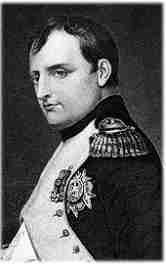|
Napoléon's Early Life
Napoléon Bonaparte was born a Frenchitizen only by a quirk of fate. The year before his birth, the island of Corsica had been purchased by France, from the Republic of Genoa.
Napoléon's Family
Napoléon Bonaparte was born in Ajaccio, Corsica on August 15, 1769, the second son of Carlo [1746-1785] and Laetitia Bonaparte [1750-1836]. His father was an Italian-born attorney who practiced law in Corsica where he met Napoléon’s mother. Eventually, the couple had a total of 8 children: Joseph [1768-1844], Napoléon, christened ‘Napoléone Buonaparte’ [1769-1821], Lucien [1775-1840], Elisa [1777-1820], Louis [1778-1846], Pauline [1780-1825], Caroline [1782-1839] and Jerôme [1784-1860].
On December 15, 1778, Carlos Bonaparte was named as the Corsican representative to the court of Louis XVI where he remained for a number of years. |
|
 |
|
Napoléon's Education
On May 15, 1779, Napoléon entered a French military school at Brienne-le-Château, a small town near Troyes, where he became an average student in all subjects except mathematics in which he excelled. In 1784 his father was influential in having him selected for the elite military academy, the École Militaire in
Paris. On October 17, 1784 he left for Paris.
On October 28 of the next year, Napoléon graduated from the École Militaire and received his commission, as a second lieutenant of artillery, in January of 1785, at the age of 16. He then attended the royal artillery school at Auxonne near Dole.
The French Revolution, 1789 - 1799
The French Revolution began on July 14 1789, with the mob storming the Bastille and lasted until 1799.
In 1791, Napoléon was promoted to first lieutenant and was posted to the 4th artillery regiment, garrisoned at Valence where he joined the Jacobin club which initially favored a constitutional monarchy. He soon became the club’s presedent and was known for his speeches against bishops, monks and nobles. He subsequently spent many months in Corsica on leave from the French army. During this time, he served in the Corsican National Guard where he was appointed a colonel. In 1792 he became a captain.
The French Revolution had been raging for three years. It reached its climax on August 10, 1792 with the overthrow of the monarchy and the Seige of the Tuileries. Louis XVI was taken into custody there and was imprisoned.
On January 21, 1793, during the Reign of Terror, Louis XVI was guillotined by the revolutionary French government. Subsequently, the leader for Corsican independence, Pasquale Paoli, declared the Bonaparte family to be outlaws because of Napoléon’s Jacobin membership and pro-French attitude. On June 11, 1793, the Bonaparte family was forced to flee from Corsica to France. Napoléon then returned to the French army.
Robespierre and the Reign of Terror
In June, 1793, a group of Jacobins, led by Maximilien Robespierre, gained control of the French government and intensified the Reign of Terror.
A number of French cities revolted against Robespierre. The insurgents, at Toulon, were aided by the Anglo-Spanish fleet which they invited to take over the town and port. Their, they seized 70 French ships, which constituted half of the French navy. Reinforcements were brought up by both sides.
Napoléon Distinguishes Himself
During the fighting for the port, the French artillery commander at Toulon had been wounded. Napoléon, who was now stationed at Nice with his regiment, was sent to replace him. In December of 1793, he positioned his battery of 46 canons on high ground overlooking the harbor where he could fire down at the British fleet. After the fleet withdrew, French troops took control of the city and Napoléon was named brigadier general for his part in the victory. Napoléon was only 24 years old.
Robespierre, Napoléon’s early mentor, fell from power on July 27, 1794. Napoléon was arrested, on a charge of conspiracy and treason. He was freed, in September, but remained out of favor and his command was not restored. Robespierre was later Executed, and the Reign of Terror was ended.
On April 21, 1795, Napoléon became engaged to Desirée Clary, the daughter of a rich Marseille businessman. She was also the sister of his older brother Joseph’s wife. [In 1798 Desirée married Jean-Baptiste-Jules Bernadotte when he returned to
Paris from Vienna. Bernadotte, a celebrated marshal of France and long time associate of Napoléon, was chosen
king of Sweden in 1818].
Napoléon I Continued >>>
|


